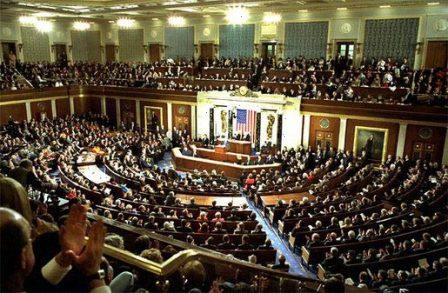
Amid a flurry of activity over the last week regarding gaming in the States of America, a bipartisan bill is being introduced in the U. S. Senate that would once again regulate legal sports betting in the country.
Republican and Democratic Leadership Behind the Bill
There might be a rush to blame one side or the other for the introduction of this bill, but it is truly a bipartisan effort to take back the reins on sports betting in the States of America. Outgoing Utah Senator and President pro tempore Republican Orrin Hatch – who will depart the Senate in January 2019 and was one of the Senators who originally passed the legislation banning sports betting in 1992, the Professional and Amateur Sports Protection Act (PASPA) – has been able to enlist the other side in a “swan song” for his time in the legislature. Democratic Minority Leader Chuck Schumer of New York joined with Hatch to introduce the bill on Wednesday.
“I knew that Congress had an obligation to ensure that the integrity of the games we love was never compromised,” Schumer stated during the announcement of the bill, called the “Sports Wagering Market Integrity Act of 2018.” “That is why I believe the time is now to establish a strong national integrity standard for sports betting that will protect consumers and the games themselves from corruption.”
Hatch had vowed back in May to introduce legislation to reinstate some sort of federal guidelines on sports betting after a key decision by the Supreme Court of the United States (SCOTUS) struck down past laws. “The legislation we’ve introduced today is the culmination of eight months of high-level meetings, discussions and negotiations,” Hatch said. “(The bill) will serve as a placeholder for the next Congress, should they decide to continue working to address these issues.”
The National Football League is so far the only major sports league that has responded with support for the proposed Hatch/Schumer bill. “The threats posed to the integrity of sporting contests cannot be confined within state borders,” Jocelyn Moore, executive vice president with the NFL, commented. “Without continued federal guidance and oversight, we are very concerned that sports leagues and state governments alone will not be able to fully protect the integrity of sporting contests and guard against the harms Congress has long recognized as being associated with sports betting.”
States Ignore Feds, Continue to Pass Sports Betting Regulations
Individual states have heard what Washington, D. C., has been saying and for the most part ignored it. While Nevada already conducted sports betting for decades and mobile gaming for at least one decade, other states like New Jersey (who brought the original lawsuit that overturned PASPA earlier this year), Delaware, West Virginia, Pennsylvania, Mississippi and Rhode Island have passed laws regarding sports betting both live and online. Washington D. C. legislators passed regulations this week to open up sports betting in the District of Columbia, while other states like Michigan, Kentucky, Missouri, Ohio, Tennessee and Virginia will all be considering some sort of legislation in 2019.
So, what are the chances of passage of the Hatch/Schumer bill? For this current Congress, the chances are highly unlikely, as they are in a logjam over funding the government. This doesn’t mean that they won’t try, however; remember, the Unlawful Internet Gaming Enforcement Act of 2006 (UIGEA) did not pass as a stand-alone bill. It was tacked on to a “must pass” piece of legislation regarding port security during the “lame duck” session in 2006 and snuck through the Congress in that manner. It wouldn’t be surprising to see the Congress attempt to do this with this current bill.
Even if they were able to get it through the Congress, whether it would stand up to scrutiny from the federal courts would be critical. The SCOTUS, in their May decision that struck down PASPA, stated that the federal government could regulate sports betting but that the manner that the 1992 bill did it was unconstitutional. You can bet that several states would be winding up for a big legal fight should this bill work its way through Congress and be signed into law. If it is signed into law and is challenged in the courts, then the states would still be able to pass regulations for their individual states.
With only days left in the current Congress, it is highly unlikely that this bill will get through. However, as Hatch commented, it does serve as a bookmark that both the House and the Senate can come back to in an attempt to shut down sports betting – again – in the States of America in 2019.























